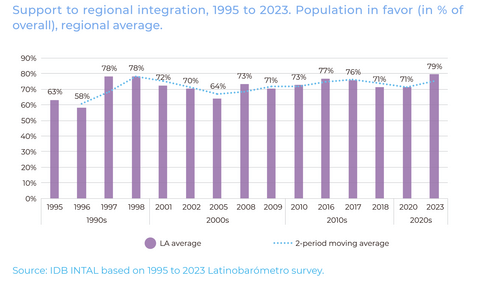A new study by the Inter-American Development Bank (IDB) shows that 79% of Latin Americans support their country’s integration with other Latin American countries, the highest level since this data began to be collected.
This is one of the findings of “América Latina en conexión: apoyo récord a la integración regional” ("Latin America in Connection: Record Support for Regional Integration"), a new study conducted by the Institute for the Integration of Latin America and the Caribbean (INTAL) of the IDB’s Integration and Trade Sector, in partnership with the firm Latinobarómetro.
The publication analyzes and characterizes Latin Americans’ strong support for regional integration, exploring this trend and the factors behind it.
The results of the study are based on more than 19,200 interviews conducted during 2023 with citizens from 17 countries in the region, with the aim of revealing their opinions on regional integration, gender, technology, and the environment, among other topics.
“The regional integration promoted by the IDB encompasses not only a physical and a digital infrastructure dimension, which we call ‘the hardware,’ but also an institutional dimension in productive development and trade, ‘the software.’ Both are key elements for the goal of fostering economic growth and improving the quality of life of Latin American and Caribbean citizens,” said Fabrizio Opertti, manager of the IDB’s Integration and Trade Sector.
The study’s main findings include:
- Support for integration is higher among men, young people, and people with a high socioeconomic and educational level.
- In the most highly educated segments of the population – those with a complete university education – support reaches 87%.
- 77% support their country’s integration with other countries outside the region (seven percentage points more than in 2020).
- 52% are optimistic about the next 10 years and believe they will not lose their jobs despite the advance of automation.
- Young people tend to give a relatively higher priority to the opportunities provided by integration to study or work abroad.
- 87% of Latin Americans consider it fundamental to develop skills in mathematics, programming, and engineering to improve their job opportunities.
- 84% believe it is likely to reconcile economic growth with care for the environment, a relevant issue on the current agenda.
The question “What does regional integration mean?” was included for the first time in the 2023 survey. A total of 61% of respondents associated it with more employment, 56% with more technology, and 52% with higher salaries. Additionally, one out of every two people related it to study or work opportunities in other countries, 46% with access to a greater variety of products, and 40% with access to cheaper goods.
According to INTAL Director Ana Basco, support for integration is related to the possible positive effects on living conditions and access to growth and employment opportunities through an expanded market that is a result of integration itself.
Latinobarómetro, one of Latin America’s leading public-opinion pollsters, annually surveys Latin Americans' opinions, attitudes, behaviors and values.

About the IDB
The Inter-American Development Bank is devoted to improving lives. Established in 1959, the IDB is a leading source of long-term financing for economic, social and institutional development in Latin America and the Caribbean. The IDB also conducts cutting-edge research and provides policy advice, technical assistance and training to public- and private-sector clients throughout the region. Take our virtual tour.
Cavelier,Andres

Beyond Borders
On this blog, the IDB Integration and Trade Sector shares reflections on the role of trade, investment, cooperation, and regional integration for development in Latin America and the Caribbean. Subscribe and join the conversation.